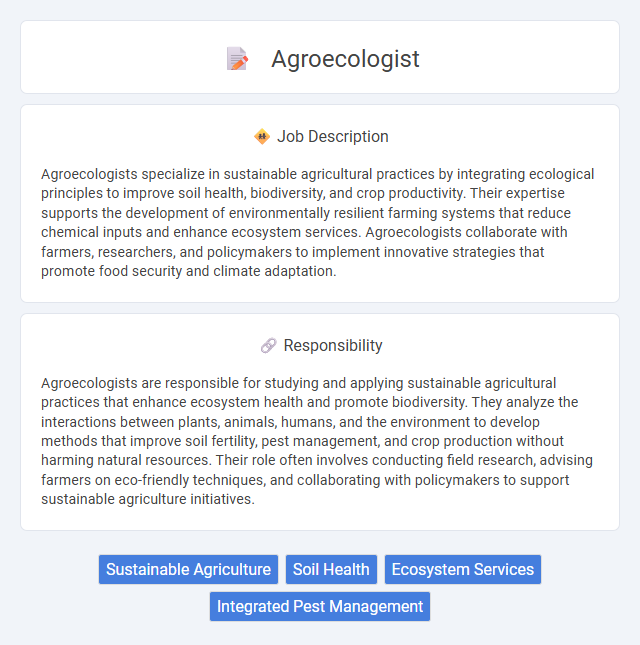
Agroecologists specialize in sustainable agricultural practices by integrating ecological principles to improve soil health, biodiversity, and crop productivity. Their expertise supports the development of environmentally resilient farming systems that reduce chemical inputs and enhance ecosystem services. Agroecologists collaborate with farmers, researchers, and policymakers to implement innovative strategies that promote food security and climate adaptation.
Individuals passionate about sustainable agriculture and environmental stewardship are likely to thrive as agroecologists, as the role often requires fieldwork in diverse and sometimes challenging outdoor conditions. Those comfortable with scientific research, data analysis, and community engagement may find the job fulfilling, whereas individuals preferring indoor, sedentary work might struggle. A strong commitment to ecological principles and adaptability to varying rural environments could increase the probability of success in this career.
Qualification
Agroecologists typically hold a bachelor's or master's degree in agroecology, environmental science, or agriculture, emphasizing courses such as soil science, plant biology, and sustainable farming practices. Proficiency in ecological principles, crop management, and data analysis is essential, alongside hands-on experience in field research or sustainable agriculture projects. Certification in organic farming or pest management can enhance employability and demonstrate expertise in eco-friendly agricultural methods.
Responsibility
Agroecologists are responsible for studying and applying sustainable agricultural practices that enhance ecosystem health and promote biodiversity. They analyze the interactions between plants, animals, humans, and the environment to develop methods that improve soil fertility, pest management, and crop production without harming natural resources. Their role often involves conducting field research, advising farmers on eco-friendly techniques, and collaborating with policymakers to support sustainable agriculture initiatives.
Benefit
Agroecologists likely contribute significant benefits by promoting sustainable farming practices that improve soil health and biodiversity. They probably enhance food security through environmentally friendly crop production methods. Their expertise may reduce reliance on chemical inputs, leading to healthier ecosystems and communities.
Challenge
The job of an agroecologist likely involves addressing complex challenges related to sustainable agriculture and environmental conservation. Balancing the needs of crop production with ecosystem health may require innovative research and adaptive management strategies. Navigating unpredictable climate patterns and socio-economic factors could add layers of difficulty to their work.
Career Advancement
Agroecologists specializing in sustainable farming techniques can advance their careers by acquiring expertise in soil health, biodiversity, and ecological pest management. Pursuing certifications in environmental sciences or agronomy and gaining experience in policy development enhances prospects for leadership roles in research institutions, governmental agencies, and international organizations. Mastery in data analysis and sustainable agriculture technologies positions agroecologists for consultancy and academic professorships, driving innovation in food security and environmental resilience.
Key Terms
Sustainable Agriculture
Agroecologists specialize in sustainable agriculture by integrating ecological principles into farming practices to enhance biodiversity, soil health, and water conservation. They develop innovative crop rotation systems, promote organic pest control, and design agroforestry models to reduce environmental impact while maintaining productivity. Their expertise supports resilient food systems that mitigate climate change effects and promote long-term agricultural sustainability.
Soil Health
Agroecologists specializing in soil health analyze soil composition, nutrient cycles, and microbial activity to promote sustainable farming practices. They implement techniques such as cover cropping, crop rotation, and organic amendments to enhance soil fertility, prevent erosion, and improve water retention. Their expertise contributes to increased agricultural productivity while maintaining ecological balance and reducing the reliance on chemical fertilizers.
Ecosystem Services
Agroecologists analyze and manage agricultural systems to enhance ecosystem services such as soil fertility, pollination, and water regulation. Their expertise supports sustainable farming practices that improve biodiversity, reduce chemical inputs, and increase resilience to climate change. By integrating ecological principles, they promote productive landscapes that deliver multiple environmental and socio-economic benefits.
Integrated Pest Management
Agroecologists specializing in Integrated Pest Management (IPM) develop sustainable strategies to control pests by combining biological, cultural, and mechanical methods with minimal chemical usage. They analyze ecosystem interactions to promote natural pest predators, reduce crop damage, and enhance soil health, fostering long-term agricultural resilience. Expertise in monitoring pest populations and implementing environmentally friendly treatments is crucial for optimizing crop yields and minimizing ecological impact.
 kuljobs.com
kuljobs.com